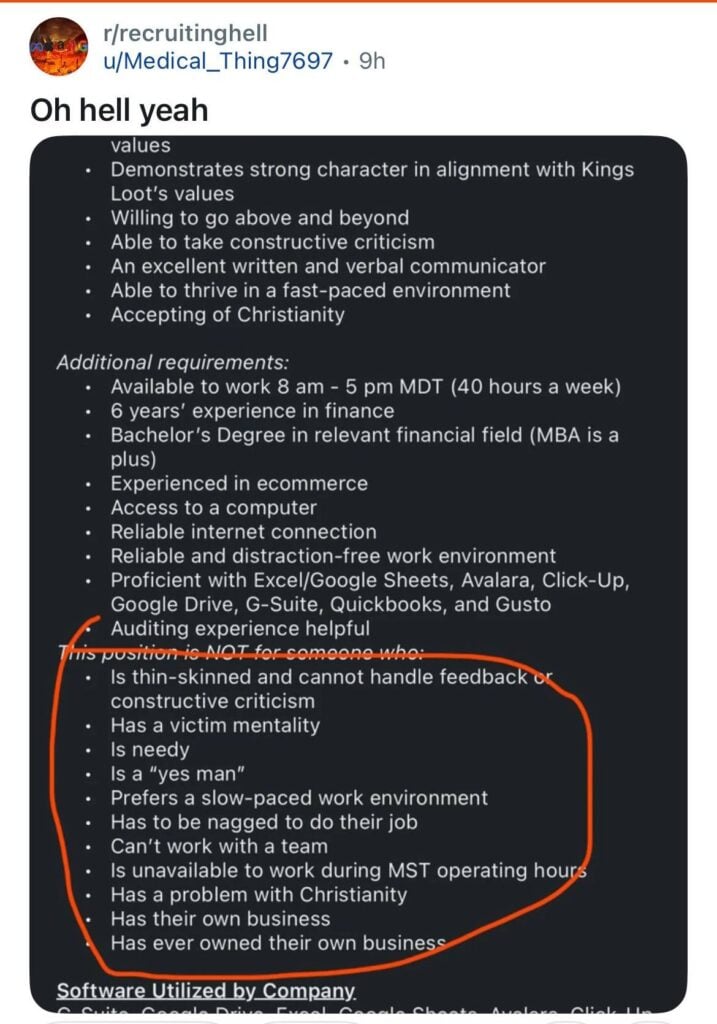After two months of searching, a good friend of mine thought he had finally found a new job. Following years of working through the chaos at a major social media company, he was ready for something different and was attracted to a content design position at a startup with flexible hours. It required a master’s degree, but he could accommodate that. The projects even sounded quite interesting.
His finger hovered over the "Apply" button when he spotted it, buried at the bottom of the job ad: Pay - hourly.
“What kind of job in tech requires a master’s degree and negotiates pay on an hourly basis?” he later asked me. “Is that a joke? I didn’t bury myself in years of student loan debt and cut my teeth working insane hours at big tech companies so I could have the same pay structure I’d have if I was checking people out at Walmart. But some of them believe you should come work for them and be willing to deal with that.”
Out of Touch
My friend’s experience isn’t unusual. It’s worth clarifying that we’re not talking about contract opportunities, which is now something of an industry norm. Rather, the problem with what he encountered was with straightforward hourly pay as an employee.
For recruiters, it’s just as difficult to deal with companies looking to hire talent in tech as it is for the candidates.
“They come to me and they want people who have worked for Facebook, worked at big tech giants, but when I ask the question ‘are you paying what those companies pay’ they aren’t,” said Jessica Smith, founder of Savant Recruiting. “Well, how do you think you’re going to get that talent then? What else are you offering them?”
That’s just the money. What about skills? Smith says SaaS and tech orgs going in search of unicorns is a big, big problem.
“One of my favorites is when they’re looking for a senior engineer whose also a product manager and also a UX designer, a dev ops expert… they want the whole engineering team in one person and they only want to pay $80k,” Smith said. “This is like going into a Ferrari dealership and asking to try out the models, then saying you only have the budget for a KIA. Do you know what you’re asking for?”
Job Ad Purgatory
For a recruiter, seeing some these job ads is amusing on a good day, but infuriating when they pile up.
Beyond unrealistic expectations, they can also include some rather bizarre requirements for skills, often that have no business relevance.
“One of the most ridiculous and telling job requirements I've seen was a “good sense of humor", said Matt Collingwood, founder and managing partner at VIQU IT Recruitment. “It came from a hiring manager who thought he was hilarious, but I got the impression his team only laughed at his jokes out of obligation. To me, this implied the new employee would be expected to do the same, which is very telling and indicative of the kind of environment that the hiring manager was creating for his employees.”
Another extreme example Collingwood gave was a job ad that listed “can afford to live on minimum wage" as a requirement.
That’s not a skill so much as a requirement that they have some other sort of income. It’s a clear signal to anyone interested in the role about what’s to come.
“To me this is a ridiculous thing to include in a job advert,” Collingwood said. “It indicates that the employer is fully aware they are paying the bare minimum. Some may think it shows the employer is concerned that the person they employ can’t live on what they're paying, but for me it indicates the complete opposite. It highlights an employer who isn't willing to even consider paying more than minimum wage, meaning they're only bothered about getting a person across the line, rather than securing the right person with the right skills to support their business.”
Some of the examples I've seen recently included things that should be obvious requirements for a job. For example, ability to work well with others.
Civility, kindness, self-awareness. The list goes on. All things that one would think are standards not just for functioning within the workplace, but in any social dynamic.
So is the fact that employers feel the need to demand these skills a sign that people have just forgotten these basic tenets of human interaction when at work? Is workplace decorum in that much trouble? Not necessarily.
“When organizations post these types of job requirements, it suggests that the hiring manager has been burned by the last person to hold the position,” Susan Snipes, Head of People at Remote People, said. “The last person in the role was lazy, incompetent, or both. The hiring manager is desperately trying to avoid hiring a similar profile by making expectations crystal clear. Unfortunately, this can backfire and turn candidates off of the job entirely.”
These cases are mild though. The requirements can quickly run wild the more traumatized the person doing the hiring is. See the example below.

Job Requirements Worth Including (But Often Overlooked)
Some of these seemingly bizarre requirements are worth including in your job ads if they’re important to alignment with organizational values. Here are some examples:
Emotional intelligence
While technical skills can be taught, emotional intelligence—the ability to understand and manage emotions effectively—is harder to develop quickly. Candidates with high emotional intelligence adapt better to team dynamics and resolve conflicts more efficiently.
Emotional intelligence encompasses:
- Self-awareness about strengths and limitations
- Empathy toward colleagues and clients
- Ability to regulate emotional responses in stressful situations
Cross-cultural competence
As workplaces have become more diverse and companies expanded globally, the ability to work effectively with people from different backgrounds has become an invaluable skill.
Now, you might be thinking, that’s nice David, but isn't DEI dying? I’d advise you not to mistake media narratives and political rhetoric for reality.
Even tech giants who happily walked back or tossed aside their DEI initiatives aren’t going to stop hiring talent across borders and have stated publicly they will still be looking to create a neurodiverse environment.
Adaptive problem-solving
The capacity to approach problems from multiple angles and adjust strategies when needed is increasingly important given the pace of change and mounting uncertainty across most industries. Adaptability should be explicitly valued in job descriptions.
Requirements That Should Be Eliminated
There are, of course, some requirements that are just a bad idea to include in job postings, particularly in the case of entry level requirements. Here are some you should look to minimize or get rid of entirely.
Vague "culture fit" requirements
Job ads often include nebulous requirements like "must be a culture fit" or "should have the right personality for our team" without explaining what these mean. This language can reinforce homogeneity and exclude qualified candidates who bring different perspectives.
Unrealistic personality demands
It’s bad enough that so many companies are still doing personality testing and assigning significant meaning to it. But then you see job postings that require candidates to be simultaneously "detail-oriented and big-picture thinkers" or "aggressive self-starters who are also team players" without acknowledging the potential contradictions.
These paradoxical requirements confuse applicants and can suggest unrealistic expectations. Everyone has a dominant working style, and that's perfectly okay.
Companies that demand contradictory personality traits often attract candidates who are skilled at projecting what employers want to see—rather than authentically qualified professionals.
Arbitrary experience requirements
"Must have exactly 7-10 years of experience" or "requires 5 years of experience with a technology that isn’t that old or complex" are requirements that deserve scrutiny. Companies should focus more on demonstrated capabilities than time served.
“I’ve had employers say they want someone with ten years of experience working on a technology that’s only existed for five,” said Smith. “It’s an indication you don’t know what you actually need.”
The Gray Area: Job Requirements That Divide Opinion
Context is everything. Some of requirements may sound ridiculous, but given the context of the company, the time the job ad is posted, or the industry, whether or not you should include is not so black and white.
Civility as a requirement
Some companies now explicitly require "civility" in their job postings.
Those in favor argue that civility creates psychological safety and reduces workplace toxicity. While you would think that civility should be common sense, ask any HR person whose been around since the arrival of the Tea Party movement in American politics if this is a given and they’ll likely laugh at you.
A company chat with not guardrails can quickly resemble a Facebook comment thread more than a exchange between colleagues.
Critics, however, counter that civility requirements can be weaponized against marginalized groups. The argument being that what's considered 'civil' is culturally relative and has historically been used to tone-police people from certain backgrounds.
Must work well under pressure
This common requirement draws mixed reactions from experts.
Some roles genuinely involve high-stress situations, and candidates should know this upfront. However, this requirement is often included in jobs that shouldn't be stressful but are due to poor management or understaffing. It normalizes unhealthy work environments."
Best Practices for Non-Technical Job Requirements
When including non-technical skills in job descriptions, recruiters should:
- Be specific about what the skill looks like in practice
- Explain why the skill matters for success in the role
- Consider how the skill will be evaluated during the hiring process
- Avoid requirements that could exclude qualified diverse candidates
- Distinguish between genuine requirements and nice-to-have qualities
Be Thoughtful
The non-technical requirements in job ads send powerful signals about company values and work environment. By thoughtfully including meaningful skills like emotional intelligence and cross-cultural competence while eliminating vague or contradictory demands, recruiters can attract candidates who will truly thrive in their organizations.
As the job market continues to evolve, the most successful companies will be those that recognize the importance of these human elements alongside technical capabilities—and communicate them clearly in their hiring processes.
What's Next?
Want to keep up with all the latest trends in recruiting and candidate sourcing? Subscribe to the People Managing People newsletter and you'll get all the latest updates and expert insights straight to your inbox.



